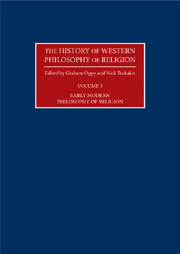Book contents
- Frontmatter
- Contents
- Editorial Introduction
- Contributors
- 1 Early Modern Philosophy of Religion: An Introduction
- 2 Niccolò Machiavelli
- 3 Martin Luther
- 4 John Calvin
- 5 Michel de Montaigne
- 6 Francisco Suárez
- 7 Thomas Hobbes
- 8 René Descartes
- 9 Ralph Cudworth
- 10 Blaise Pascal
- 11 Baruch Spinoza
- 12 John Locke
- 13 Gottfried Wilhelm Leibniz
- 14 George Berkeley
- 15 Voltaire
- 16 The Deists
- 17 Jonathan Edwards
- 18 Thomas Reid
- 19 David Hume
- 20 Denis Diderot
- 21 Immanuel Kant
- 22 Gotthold Ephraim Lessing
- 23 William Paley
- Chronology
- Bibliography
- Index
20 - Denis Diderot
- Frontmatter
- Contents
- Editorial Introduction
- Contributors
- 1 Early Modern Philosophy of Religion: An Introduction
- 2 Niccolò Machiavelli
- 3 Martin Luther
- 4 John Calvin
- 5 Michel de Montaigne
- 6 Francisco Suárez
- 7 Thomas Hobbes
- 8 René Descartes
- 9 Ralph Cudworth
- 10 Blaise Pascal
- 11 Baruch Spinoza
- 12 John Locke
- 13 Gottfried Wilhelm Leibniz
- 14 George Berkeley
- 15 Voltaire
- 16 The Deists
- 17 Jonathan Edwards
- 18 Thomas Reid
- 19 David Hume
- 20 Denis Diderot
- 21 Immanuel Kant
- 22 Gotthold Ephraim Lessing
- 23 William Paley
- Chronology
- Bibliography
- Index
Summary
Any attempt to assess the attitude Denis Diderot (1713–84) took towards religion has to cope with the fact that the eighteenth-century philosophes, of whom Diderot was among the most prominent, are still rather controversial figures. To some commentators, both in their own time and in ours, their influence was a negative and baleful one. One of Diderot's contemporaries described him as a man “blind to the principles of religion and morality” (Chaudon 1759: 95), a comment echoed frequently during his lifetime (Trousson 1997) and even into our own day. Hence, the online Catholic Encyclopedia asserts that in the Encyclopédie:
Reason gradually freed itself from the superstition of the past and claimed absolute independence. Ancient, or rather Christian, conceptions of God and the world were not even deemed worthy of the serious consideration of a ‘thinker’ … soon the possibility of miracles and revelation was denied, while mysteries were regarded as absurd. Thus, in the place of traditional beliefs, new ideas were introduced, tending to rationalism, materialism, naturalism, and deism.
(Catholic Encylopedia n.d.)The persistence of these views (which certainly characterize much of what we now mean by ‘the Enlightenment’; see Israel 2006b) has coloured to a considerable extent the way in which Diderot's attitude to religion has been perceived even by those with no theological axe to grind. His atheistic reputation has, conversely, helped to propel him into the ranks of those who are eulogized for leading the campaign against superstition and obscurantist religious dogma of all kinds.
- Type
- Chapter
- Information
- The History of Western Philosophy of Religion , pp. 263 - 276Publisher: Acumen PublishingPrint publication year: 2009

